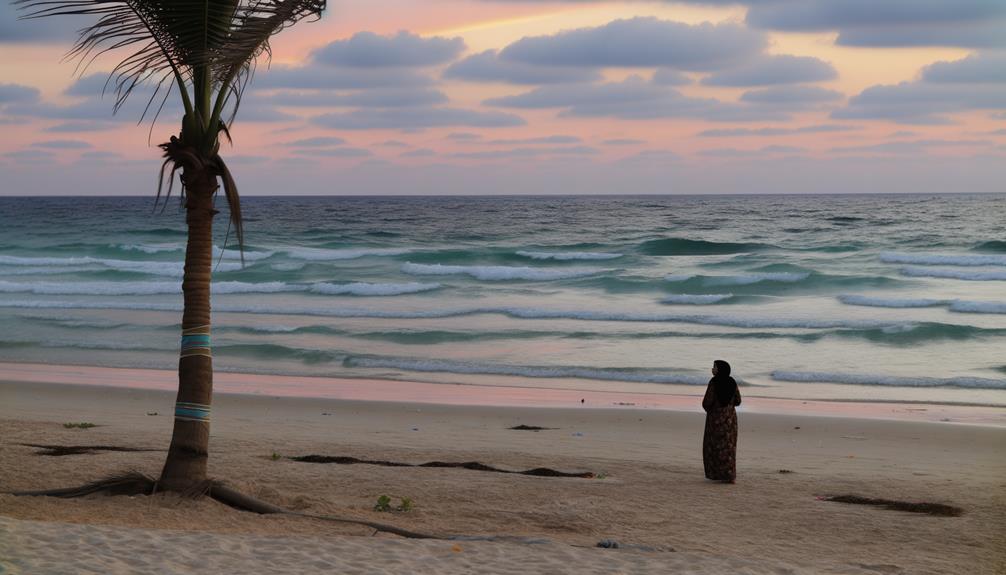Meaning of the Name Kailani
The name Kailani, originating from Hawaiian, combines 'kai' meaning 'sea' and 'lani' signifying 'heaven' or 'sky.' This etymological blend captures the Hawaiian cultural reverence for nature and spirituality. Linguistically, Kailani showcases the interconnectedness of ocean and celestial elements, emphasizing the deep-rooted connection between land and cosmos.
The name embodies a rich cultural heritage, reflecting a unity of earthly and heavenly forces, and is increasingly embraced beyond Hawaiian communities. This timeless representation of Hawaiian identity continues to resonate deeply with cultural pride and historical lineage.
Explore further to understand the profound symbolism and cultural significance behind Kailani.

Key Takeaways
- Kailani means 'sea and sky' in Hawaiian, combining 'kai' (sea) and 'lani' (heaven or sky).
- The name reflects Hawaii's deep connection to nature and spirituality.
- Kailani symbolizes the harmonious relationship between the ocean and the heavens.
- It embodies the Hawaiian cultural values of interconnectedness and balance.
- Kailani has gained popularity beyond Hawaii, appreciated for its cultural and linguistic beauty.
Origin of Kailani
The name Kailani originates from the Hawaiian language, combining 'kai,' meaning 'sea,' and 'lani,' meaning 'heaven' or 'sky.' This etymological fusion reflects Hawaii's profound connection to its natural environment, where the sea and sky play integral roles in both daily life and cultural mythology.
Historically, Hawaiian names often encapsulate elements of nature, spirituality, and familial lineage, serving as a living tribute to the islanders' reverence for their surroundings. The name Kailani, thus, is not merely a label but a poetic representation of the interconnectedness of earth and cosmos.
This nomenclature practice underscores the Hawaiian linguistic tradition of imbuing names with deep, symbolic significance, fostering a sense of identity rooted in nature and the celestial domain.
Linguistic Breakdown
Delving into the linguistic structure of Kailani reveals a compound formation where 'kai' signifies 'sea' and 'lani' denotes 'heaven' or 'sky' in Hawaiian. This amalgamation exemplifies a common morphological pattern in Polynesian languages, where combining elements results in evocative meanings.
'Kai,' rooted in Proto-Polynesian *tai, reflects the oceanic environment pivotal to Hawaiian culture. 'Lani,' derived from Proto-Polynesian *laŋi, conveys celestial or divine connotations, emphasizing the spiritual and natural world. The juxtaposition of these terms within Kailani underscores a harmonious relationship between the ocean and the heavens, central to Hawaiian cosmology.
This linguistic blend illustrates the deep connection between language, environment, and cultural identity in Hawaiian etymology.
Cultural Significance
In Hawaiian culture, the name Kailani encapsulates both a reverence for nature and a profound spiritual connection. This name intricately links individuals to the elemental forces of the islands, emphasizing the importance of both land and sea in Hawaiian traditions. Historically, names like Kailani reflect a deep intertwining of identity and the natural world. Similarly, the meaning behind Lakota names often conveys significant cultural values and relationships to the environment, highlighting the importance of community and heritage. Just as Kailani connects to the spirit of the ocean and sky, Lakota names serve as a reminder of the individual’s connection to their ancestors and the land they cherish. Both naming traditions celebrate the unique bond between people and the natural world, reinforcing the identity and beliefs of their respective cultures.
Nature Reverence: Kailani combines 'kai' (sea) and 'lani' (heaven), symbolizing the harmony between ocean and sky, central to Hawaii's ecosystem.
Spiritual Significance: The name suggests a sacred relationship with natural elements, aligning with the Hawaiian belief in the spiritual essence of nature.
Cultural Heritage: Naming conventions in Hawaii often honor ancestral connections and environmental stewardship, showcasing the cultural pride and historical lineage inherent in the name Kailani.
Symbolism and Imagery
Building upon its cultural importance, the name Kailani evokes powerful symbolism and vivid imagery that resonate deeply within Hawaiian traditions.
Derived from the Hawaiian roots 'kai' (sea) and 'lani' (heaven or sky), Kailani encapsulates the harmonious interplay between the ocean and the celestial domain. This name conjures images of serene seascapes under expansive, star-studded skies, embodying the interconnectedness and balance revered in Hawaiian cosmology.
Historically, the ocean has been a crucial source of sustenance and spiritual significance, while the sky represents divine guidance. Consequently, Kailani symbolizes a unity of earthly and heavenly elements, reflecting a profound respect for nature's dualities.
This linguistic blend underscores the name's poetic resonance and cultural depth, making it a timeless representation of Hawaiian heritage.
Popularity and Usage
Across various cultures and time periods, the name Kailani has seen fluctuating levels of popularity and diverse applications. Historically rooted in Hawaiian culture, Kailani has gradually gained recognition in Western countries, particularly in the United States.
The name's usage reflects its cultural richness and linguistic beauty, leading to its wider adoption.
Key points about Kailani's popularity and usage include:
- Hawaiian Origin: Initially exclusive to Hawaiian communities, representing 'sea and sky.'
- Modern Adoption: Increasingly embraced in the U.S. and other Western nations since the early 2000s.
- Celebrity Influence: Usage has been bolstered by public figures naming their children Kailani, enhancing its appeal.
These factors illustrate Kailani's evolving prominence and enduring charm.
Conclusion
The name Kailani, rooted in Hawaiian culture, encapsulates profound symbolic meanings linked to nature and spirituality. Its linguistic breakdown reveals a composite of 'kai' (sea) and 'lani' (heaven), reflecting a deep cultural reverence for the natural world.
Despite potential objections regarding its perceived exoticism in non-Hawaiian contexts, the name's growing popularity underscores an appreciation for its rich cultural heritage and evocative imagery, demonstrating the global resonance of names with significant historical and linguistic depth.






